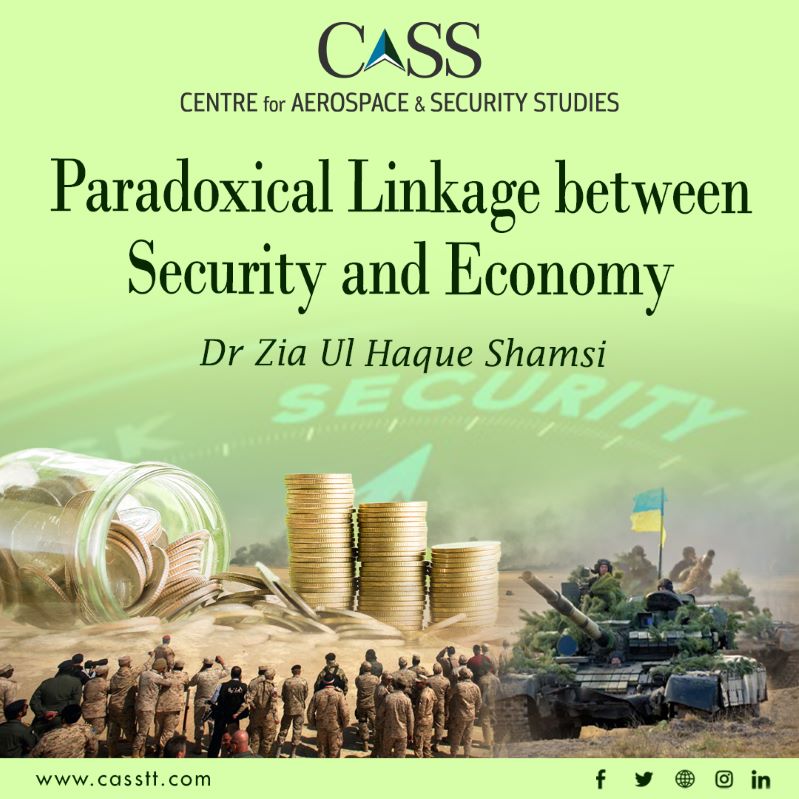The purpose of writing on this subject is to initiate a debate in Pakistan on the paradoxical linkage between security and economy and reach an understanding to determine who must decide whether for security one needs a strong economy or a strong economy is a prerequisite for the sound security of any state.
When the erstwhile Soviet Union disintegrated as a political entity, there was no dearth of security apparatus on its inventory, especially once the dissolution process started in 1988, and was completed within three years before it lost its identity in December 1991. Likewise, the illogical invasion of Kuwait in August 1990, resulted in Iraq’s own destruction following a war between Unequal Military Powers (UMPs). Iraq was neither poor nor militarily weak that any of its neighbours could run over it.
However, without going too far back in the history of wars and conflicts, the ongoing Russia-Ukraine War also calls for introspection into this paradoxical linkage between security and the economy.
Russia launched a ground offensive on Ukraine on 24 February 2022, fearing that the latter was about to join the North Atlantic Treaty Organization (NATO), which would have brought a perceived hostile alliance to Russian doorsteps. Ukraine, a developing country by European standards, has vast natural resources, and the second-largest reserves of natural gas, after Russia. Moreover, Ukraine accounts for 10% of the world wheat market, 15% of the corn market, and 13% of the barley market. With more than 50% of world trade, it is also the main player in the sunflower oil market.
Ukraine may have been a poor country by European standards, but neither its economy nor military was so weak that any of its neighbours, except Russia, could launch an all-out military campaign at will. Russia has not only invaded Ukraine but has started slicing its eastern territories and so far, has declared at least four Russian ethnic regions as autonomous, meaning it has no intention to leave unless it gets defeated, which is highly unlikely.
Hence, there are many examples from history and contemporary times where states were ruined in wars and conflicts between UMPs, in which neither the country was so poor, nor its military was so weak that it could be run over so easily. Therefore, the debate that I want to initiate is to determine how much military power is adequate to ensure security, and how much economic strength is needed to sustain it. However, this must not be confused with the nuclear threshold, because that is a different debate.
While security in a changed paradigm is contested vis-à-vis human security, the economy remains a cornerstone in any debate. Therefore, it is extremely important for each state to determine its security needs and corresponding economic strength to maintain and sustain it.
The next question would be who determines the security policy of a state. According to the Chinese sage Sun Tzu, it is the Emperor (the Chief Executive) who would identify the needs and allocate resources to achieve the assigned tasks. However, it would be the job of the Commander of the Armed Forces to employ the allocated means and make a suitable strategy to accomplish objectives.
Sun Tzu further illustrates his dicta that none would interfere in the job of the other, meaning that once the political leadership identifies the security needs and allocates the requisite means, then it is the responsibility of the military commander to ensure that the assigned tasks are accomplished to the best of their abilities. In case, the military commander thinks that the assigned tasks are beyond his material capacity, then he can always go back to the leadership for revision of the task or allocation of more resources.
It is understandable that material resources may not be adequate for the assigned tasks, therefore, it is incumbent upon the political leadership to assign only doable tasks and the requisite resources to demand the military’s output. Concurrently, it is the responsibility of the military commander to ensure that his assessment of the strategic environment is based on sound and realistic information.
The politico-military leadership has to correctly determine the strategic needs vis-à-vis available means. Any imbalance between the two will either compromise human security needs or the security needs of the state. Therefore, in my view, an intense debate on the subject is essentially required, especially in a country like ours, where the security needs are also genuine and the economic outlook is also not very promising.
Dr Zia Ul Haque Shamsi is the author of ‘Nuclear Deterrence and Conflict Management Between India and Pakistan’ and ‘South Asia Needs Hybrid Peace.’ He is presently working as Director (Peace and Conflict Studies) at the Centre for Aerospace & Security Studies (CASS), Islamabad, Pakistan. The article was first published in Daily Times. He can be contacted at: dir.pcs@casstt.com.




